Fully Funded | Impressive Research | SPED Handbook | Information Session | Apply Now
Learn from leading researchers in the field of special education
Our nationally ranked University of Oregon Special Education program has a track record of preparing graduates to stand out in their careers and improve educational practices. The research, resources, and practices our program faculty conduct impacts the field of education in the US and globally.
Our doctoral training experience is unique and individualized. Our program competencies (see handbook) are designed to support you to develop expertise in the domains of teaching, service, and research. Working with your advisor and other program faculty, you will create a plan that will provide you expertise in the areas you are interested in studying while being exposed to all of the service and research experiences our program and COE faculty conduct.

Our program faculty teach and research a wide range of topics in the field of special education (e.g., dual language learners, assessment, autism, social emotional learning, early childhood, behavioral analysis, post-school community engagement, instruction, equity in school discipline, etc.) with a critical eye toward improving systems and practices to promote equity in educational outcomes for all students. We typically admit 4-8 students a year to work as a cohort to maximize your learning and experiences.
All admitted students receive four years of funding (including tuition and health insurance coverage).
New Training Opportunity! Project LMAESTRO will prepare future special education leaders in research, practitioner preparation, and community collaboration focused on:
- supporting young children with special needs including children with autism
- implementation science
- culturally and linguistically responsive practices
Accepted students will receive full tuition, insurance, and a stipend plus:
- Mentorship and training opportunities with autism experts across our project network
- Community partnered research and practical training opportunities
For more information on LMAESTRO, contact Dr. Stephanie Shire sshire@uoregon.edu
Information Session
Want to learn more? Didn't get a chance to attend our info session Monday, October 23, 2023? That's okay, we've got you covered! Watch a recorded information session to learn more about the doctoral degree program.
We have a proven track record of students completing in less than 5 years and our graduates obtain leadership positions in the following areas:
What our students are saying
Why did you choose to come to the UO?
“I saw an opportunity to work with UO faculty members who are making a tremendous impact in the local and global communities.”
--Rikki Wheatley, Current third year doctoral student
What projects are you excited to work on?
The SIMPLE grant - Dr. James Sinclair focusing on mental health supports and integration of mental health for high school students with disabilities.
--Current second year doctoral student
Check out the impressive research our students are doing by visiting the Doctoral Ducks research site: https://blogs.uoregon.edu/speddoc/.
Unique and Individualized Doctoral Training Experience
- Individualized plan of study: Our program competencies (see handbook) are designed to support each candidate to develop expertise in the domains of university teaching, service, and research. How a candidate satisfies each competency is individualized to the candidate’s interests in collaboration with program faculty.
- Collaborative Learning Environment: Each year approximately 4-8 students are accepted and work with one another using a cohort approach to create a collaborative and supportive learning experience.
